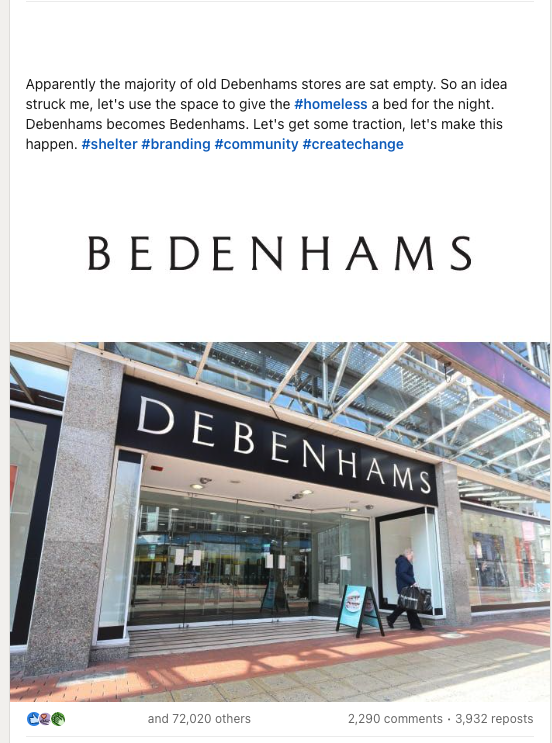Why Can't We Just

The other day I was telling someone about the guy in the Brighton subreddit who was trying to recreate Churchill Square Debenhams in Minecraft (a legend) and it made me think of this, which I wrote a couple of years ago but am still reminded of sometimes.
Back around Christmas, I made the mistake of looking at Linkedin, and I saw this:

Before I get going on this, I want to be clear: I do understand and sympathise with the instinct on display in this post! If you see a problem, you want to fix it. But… well, to start with, this is a very Design Guy idea. I mean, this isn’t even an initiative, this is a name. The fundamental thing isn’t the idea, it’s flipping the logo around so people who share ‘inspirational’ content on Linkedin will say ‘damn, it’s true’. I think branding does matter, certainly, but it has to be in service of something of substance. How would this actually work in practice?
To start: if you want to do something with “the majority of old Debenhams stores” you’re not going to be dealing with Debenhams. Debenhams plc went into administration in April 2020; its brand and website were sold to fast-fashion giant Boohoo Group in January 2021, a winding-up order was made and a reciever was appointed. Debenhams Retail Limited and Debenhams Properties Limited, the trading arms of the company (big companies often have weird structures like this) technically remain in existence, but this will largely be a formality, as they're going to have a lot of creditors who will want to be able to get at least some of their money and unwinding a big business takes time.
The point is, the fact that the name is still on a load of shops does not imply anything about the ownership of those spaces. You will probably not be dealing with one organisation, but rather with a patchwork of commercial landlords of various kinds who own the former Debenhams properties. This isn’t going to be the same everywhere, of course, but take for example the Debenhams in Brighton, where I live. It was right at the back of Churchill Square, the big mall in the centre of town. (Editor's note from the future: it's now an Ikea.) I cannot imagine Churchill Square would be particularly happy if you tried to spice up the biggest shopping period of the year by introducing a bunch of homeless people to their store; nor would the leaseholders of the adjacent shops.
What if they were, though? Let’s assume every commercial landlord in the UK is visited by the Ghosts of Christmas Past, Present and Future. We’ve got the buildings. Who is going to administer them? Are you going to just stick a load of homeless people in an empty commercial space? Even if we’re assuming the landlord is going to provide heat, water and electricity free of charge (what's a few more wacky premises at this point?) is there going to be any provision for food? How will space be apportioned? What happens if someone starts a fight?
The closest comparison to this kind of thing I can think of is when vaccination centres were opened in unused commercial properties all over the country, which I I suspect is what was on the mind of the guy who came up with this. The NHS, however, is the biggest employer in the UK, and one of the last bits of the state that still has any capacity to undertake large-scale logistical projects. Who’s going to run this? Local councils do not have a lot of money or capacity at the moment. Their homeless support services—as you may have noticed if you live in an urban area and have left your house at all recently—are not able to meet demand. Where are the people you need to actually run the shelter you’ve created going to come from?
To be clear: these objections are not rock-solid diamond-plated no-argument-to-be-had things. But it’s not that these problems are insurmountable—it’s that they’re not just incidental details but rather the core of the issue. I would say that it is a moral imperative for people to give some thought to this stuff before they start throwing out suggestions that seem like they could be something that could ‘just be done’ but in reality would be an insane amount of effort, or just not work at all. I'm fine with posing Big Ideas if they're clearly theoretical—"do away with computers"; but this has the brainfeel of something that might be possible if you don't really think about it, so tens of thousands of people are going to carry some version of this around in their heads instead of something that might actually help people.
I’m not trying to ding people for *not knowing stuff—*though there is also a level of stuff I feel like people should know, or at least should intuit that there’s more to and then spend a minute thinking about. I do not, however, want to sound like the tech blogger who is trying to reinvent himself as a public policy guy, or the lad who talked about how he's smarter than everyone in Homebase or whatever. I know folk are busy, they see something that sounds alright, solves a big problem, wahey, they hit like, whatever. I think the responsibility ultimately lies with the people making the plausible-sounding-but-ultimately-imo-very-spurious suggestions.
The messed-up thing is that there is a "simple" answer to moving toward solving the problem of homelessness in this country. It's one that belies a lot of complexity, sure, but can be stated in four words: properly funded public services. I appreciate if you work in marketing you start to see everything as a sales problem, but if gimmicks could fix social problems caused by governmental inaction then the last decade and a half would've created the perfect society.
- ← Previous
Wherever You Work, There You Are - Next →
Change And Decay In All Around I See